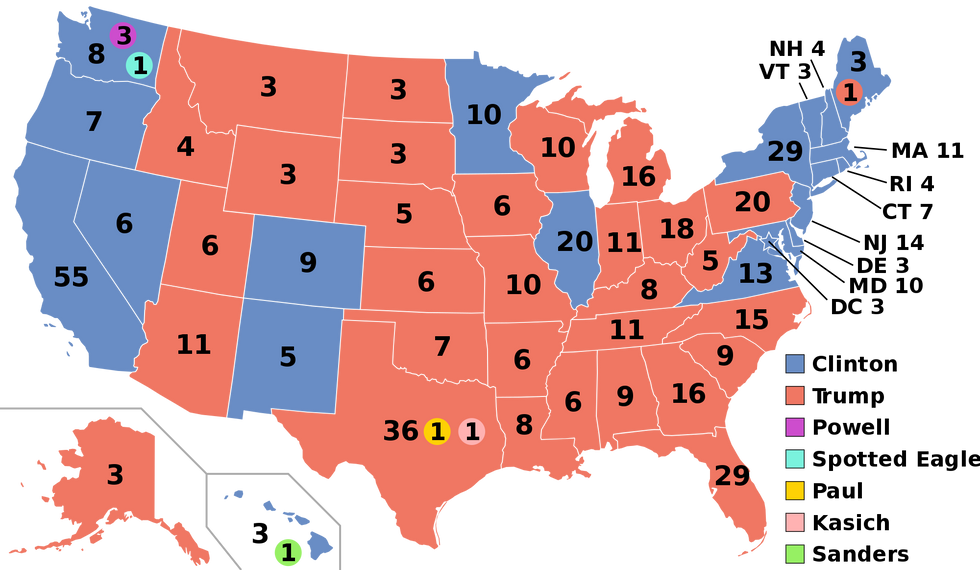When Republican candidate Donald Trump was elected to the presidency in 2016, many Americans were confused. The Democratic candidate Hillary Clinton had, after all, won the vote of the American people, 48% to Trump's 46%. Confusingly, however, Donald Trump still won the presidency, raising questions as to how our democracy could allow the loser of the popular vote to win the presidential election. So what had given him his win? He won the vote of the Electoral College. And what is the Electoral College, and how does it work?
Firstly, the American people cast ballots in their states for the presidential candidate of their choice. Then, each state tallies the votes of its populace. Whichever candidate wins the majority of that state's popular vote wins the state. Now, most Americans assume that when they vote for their chosen candidate, the election is over, and whichever candidate has won the majority of the people's vote has automatically won the presidency. This is not the case.
Once a candidate has won a state, he wins that state's electors. What are electors? Electors are the body of politicians that make up the Electoral College. Each state, according to Article II, Section 1, Clause 3 of the United States Constitution, has a number of electors equal to the number of senators and representatives in the United States Congress it has. For instance, South Carolina has 7 members in the House of Representatives, and each state has 2 senators. Added together, the state of South Carolina is granted, 9 electors. New York, by contrast, has 27 representatives and 2 senators. Therefore, New York has 29 electors.
So when the American people vote for the presidential candidate of their choice, they are only telling their electors which candidate to vote for. And so, after the vote of the American people has been tallied in their states, the electors convene to make their vote. The Constitution requires a bare majority of the electoral vote for a candidate to win the presidency. There are 538 electors; the candidate with a majority of 270 wins the election. This means that even if a candidate loses the popular vote, as Donald Trump did in 2016, and still wins a majority of electoral, then said candidate still wins the election.
But why this system? Why make the presidential election so difficult? The Framers believed most strongly that the voices of the people would not be represented adequately in the election of their national leader if a pure majority vote of the citizens of the United States. To put this simply, I'll make some painfully obvious remarks: Each state has a certain population level, and some states are, population-wise, numerically superior to others. The population of each state has different values and needs than those of other states. If the election of the President of the United States, then, were decided by a pure majority vote of the people, then large states would have the most say in the outcome of an election. In modern terms, this means states like California, Texas, Florida, and New York would have more say in the selection of the president than any other region in the United States, even if the rest of the states disagree with that decision. Recall the popular vote of the 2016 election:

Clearly, the votes won by the current president are more spread out, covering and representing most of the mainland United States. His message appealed to a variety of regions with different needs. His opponent may have won the popular vote, but it was in small pockets of the country, representing specific regions whose interests cannot be indicative of the rest of the country.
This is the purpose of the Electoral College as the Framers envisaged it: a rule of the majority, but a protection of the rights and voices of the minority. In other words, "majority rule, minority rights." This way, all the people's voices will be heard, not just a bare majority.
Thanks all for reading; until next time, adieu.

















